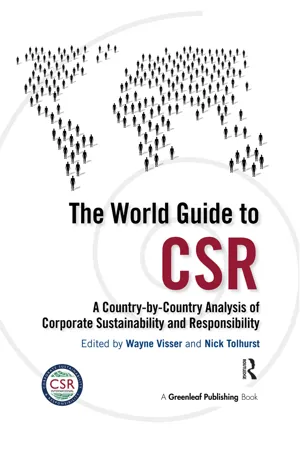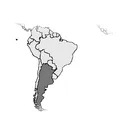![]()
B
Country profiles
![]()
1 Argentina
María Irigoyen
Project Director, ReporteSocial.com.
❚ Context
CSR in Argentina has gradually evolved through the years, influenced by the country’s cultural, historical and religious traditions. Its origins date back to the period of the Spanish viceroyalty, when the Catholic Church helped the poor through the Christian concept of charity. When Argentina became an independent state in 1816, the governing class took over this role, mostly through philanthropic activities.
During the mid 20th century, Peron’s welfare state was marked by the concept of social justice, and in the 1980s civil society organisations played a stronger role in addressing society’s needs through solidarity. In the 1990s, the concept of CSR was introduced in the media and some corporate circles (Milberg et al. 2003).
In 2001, Argentina suffered a severe economic, political and social crisis that had a profound impact on poverty, social exclusion and insecurity, generating mistrust in practically all institutions. In this context, companies developed philanthropic activities to meet basic community needs, compensating for a weak state and orientating their CSR activities to short-term poverty alleviation (Paladino et al. 2006).
However, once out of this situation, a new interest in responsible business practices emerged, and the beginning of the 21st century saw the rise of many CSR organisations, university courses, a new interest in the media, public–private partnerships, and seminars in related fields. Community contributions became increasingly seen as just one of the many dimensions of CSR, understood as a broader concept covering all stakeholder relationships (Berger et al. 2005).
Best practices began to include stakeholder engagement to inform decision-making processes, ethical supply chains, CSR reports and CSR governance structures. Many of these initiatives were promoted and disseminated by multinational companies.
Despite this evolution, CSR practices are still to a great extent the business of a few large companies and have yet to be further integrated into small and medium enterprises. Many organisations continue to focus on community activities, but there is greater CSR awareness, and these practices co-exist and are gradually evolving into a model where responsibility is integrated into all business areas.
❚ Priority issues
Sustainable economic growth
After a period of strong growth, in 2008 the Argentine economy started to decelerate due to domestic and international factors. In this context, and given Argentina’s history of economic instability, achieving sustainable growth is challenging and requires ensuring a predictable institutional environment favourable to long-term planning. Priority issues for sustaining economic growth with social equity include: macroeconomic stability through prudent fiscal policies; investment to address bottlenecks to expanded economic activity; private sector development to improve productivity performance; trade policies that create new opportunities; and education policies that build a skilled labour force for future economic demands (World Bank 2006).
Building transparency
According to the Transparency International 2009 Corruption Perception Index, Argentina rates 106 out of 180 countries (where 1st means least corruption). Transparency policy needs to be deepened in the executive power of government, and extended to the judicial and legislative branches. Promoting judicial independence remains crucial: out of 750 corruption cases analysed, only 7% resulted in convictions, judicial investigations last an average of 15 years, and little has been done to guarantee the physical safety of witnesses (Gruenberg 2008). The manipulation of statistical data also remains a major concern.
Informal employment
In Argentina, 39.1% of workers are in the informal market, and this situation is worse for women and youth: 57.4% of informal workers are under 24 years and women are also disproportionately represented in this sector (Encuesta Permanente de Hogares 2007). Informality is linked to vulnerable living conditions, as workers have no access to social safety nets or credit. They also lack legal protection and have lower wages and unstable employment.
Quality education
Even though Argentina has done well in achieving universal education, improving educational quality remains a priority; the country was bottom of the Latin American countries participating in the 2006 Programme for International Student Assessment (PISA) evaluations of reading comprehension skills. An average of 50% of students who enter secondary school do not graduate, and only one in four students from families in the poorest population quintile graduates (World Bank 2006).
Desertification
Eighty per cent of Argentine territory is used for farming, livestock and forestry activities, with 60 million acres affected by different degrees and processes of desertification. This situation is critical in arid and semiarid zones, which constitute 75% of the national territory and are home to 30% of the population, and where productivity loss also results in the deterioration of living conditions (Secretaría de Ambiente y Desarrollo Sustentable de la Nación 2009).
❚ Trends
Aligned with the CSR focus in the 1990s, many studies analysed community investment and philanthropic business trends (for an example see Berger 1998). As a broader notion of CSR developed, research on trends expanded.
The CSR survey conducted by Berger et al. (2005) with over 150 of the largest Argentine companies found that 86% had a code of ethics and 56% an ethics committee. Those with an annual community donations budget increased this from 51% in 1997 to 61% in 2005. Regarding responsible value chain practices, 71% have explicit rules to prevent discrimination, 48% require their suppliers to meet social and environmental criteria beyond legal obligations and 48% have education programmes to inform consumers on product and services risks. Approximately one-third of these companies publish an annual CSR report, and of these, 61% do it according to recognised standards.
The survey results suggest that CSR is definitely on the agendas of the largest Argentinian companies, but the degree of institutionalisation and implementation of specific practices is still a challenge. A recent survey by PwC (PricewaterhouseCoopers) found that some of the main difficulties encountered by local companies in implementing sustainability practices include the economic investment needed (48%), little consumer appreciation for these initiatives (21%) and lack of top management awareness (17%) (Redolfi et al. 2009).
Another survey, conducted by datosclaros for the business magazine Mercado, shows that CSR continues to be a largely unknown public issue: six out of ten people interviewed had never heard of CSR (Rodríguez Petersen 2008a).
Nonetheless, society agrees with a more responsible role for business: 94% of people interviewed thought it was essential for companies to communicate their CSR actions, compared to 87% in 2007 and 74% in 2006; and 87% of companies had implemented a CSR-related action during 2008, with a large focus on education and environment (Rodríguez Petersen 2008b).
Despite this progress, 41% of company directors interpret CSR as making contributions to society, and 33% of the public agree. The public almost unanimously agree that beneficiaries should be included in decision-making processes, while 36% of the companies said that during 2008 this did not occur. Only 28% of businesses agree with the state evaluating the impact of CSR on society, compared with 50% of the public who think this is a good idea.
❚ Legislation and codes
In recent years several legislative projects on CSR-related issues have emerged. In 2005 a project was proposed to establish mandatory reporting on economic, social and environmental performance for companies with more than 300 employees. Similar initiatives have also been proposed in the province and city of Buenos Aires. It is also relevant to mention the Social Volunteering Law (Ley 25.855) which promotes citizen participation in community nonprofit activities, but has yet to be implemented.
Other national laws which touch on key ethical, social and environmental issues include:
- Public Ethics Law (Ley 25.188) which introduces ethical criteria in the exercise of public functions
- National Employment Law (Ley 20.744) includes ethical work-related aspects such as discrimination, and has been modified and complemented by norms that expand on these issues: occupational health and safety (Ley 24.557), social employee benefits (Ley 26.341), child labour (Ley 26.390) and maternity rights (Ley 21.824)
- Environmental Protection Norms are addressed in the 1994 reform of the Argentine National Constitution, which incorporated new rights and guarantees. Among these, Article 41 established the right to a healthy environment and, in this context, the National Congress sanctioned environmental protection norms including laws on Industrial and Service Activities Waste Integral Management (Ley 25.612); PCBs Management and Elimination (Ley 25.670); General Environmental Law (Ley 25.675); Environmental Water Management (Ley 25.688); Access to Public Environmental Information (Ley 25.831); Domiciliary Waste Management (Ley 25.916); and Deforestation (Ley 26.331). Of these, the General Environmental Law is key as it establishes the principles, objectives and instruments of the Argentine National Environmental Policy.
International standards are also part of the Argentine CSR landscape. The number of Global Reporting Initiative (GRI) reporters is increasing, and by July 2008 305 organisations had adhered to the local network of the UN Global Compact. There is also growing interest in the new ISO 26000 guideline on CSR.
❚ Organisations
In recent years many organisations have emerged across the country to promote CSR. Key business associations and other member-based organisations include:
❚ Consejo Empresario para el Desarrollo Sostenible. As the Argentinian chapter of the World Business Council for Sustainable Development, this business association promotes sustainable development and currently has more than 50 corporate members. http://www.ceads.org.ar
❚ Foro del Sector Social. In 1999, 43 business leaders signed a collaboration agreement with this organisation that groups 3,000 of the most important NGOs in the country, and 70 others joined the CSR Programme that was created. http://www.forodelsectorsocial.org.ar
❚ Fundación del Tucumán. A member of Forum Empresa, this business association with more than 100 members promotes sustainable business practices with a focus in Northwest Argentina. http://www.fundaciondeltucuman.org.ar
❚ Grupo de Fundaciones y Empresas. This group promotes social private investment in Argentina and currently includes 27 companies and company foundations. http://www.gdfe.org.ar
❊ Instituto Argentino de Responsabilidad Social Empresaria. Founded in Córdoba, this NGO is a key CSR promoter and currently has more than 100 members. http://www.iarse.org
❚ MoveRSE. With a focus in the City of Rosario, this organisation promotes sustainable inclusive business practices and has 20 members. http://www.moverse.org
❚ VALOS. Created to promote sustainable business practices in Mendoza, this business association currently has more than 70 members. http://www.valos.org.ar
International business chambers and national sector chambers also play a significant role in CSR promotion in Argentina. Other CSR promoters include the Instituto para el Desarrollo Empresarial de la Argentina which has a CSR working group and various published documents, and the Asociación Cristiana de Dirigentes de Empresa which promotes Christian values and ethics in business.
❚ Case studies
The following cases represent emblematic CSR practices of leading companies in Argentina:
Grupo Arcor
Founded in 1951, this leading Argentine industrial group, specialising in the manufacture of confectionery, cookies, ice cream and foodstuff, has followed a development model based on generating economic, social and environmental value. Through a participative CSR process, the company integrates ethical criteria throughout its supply chain, contr...

